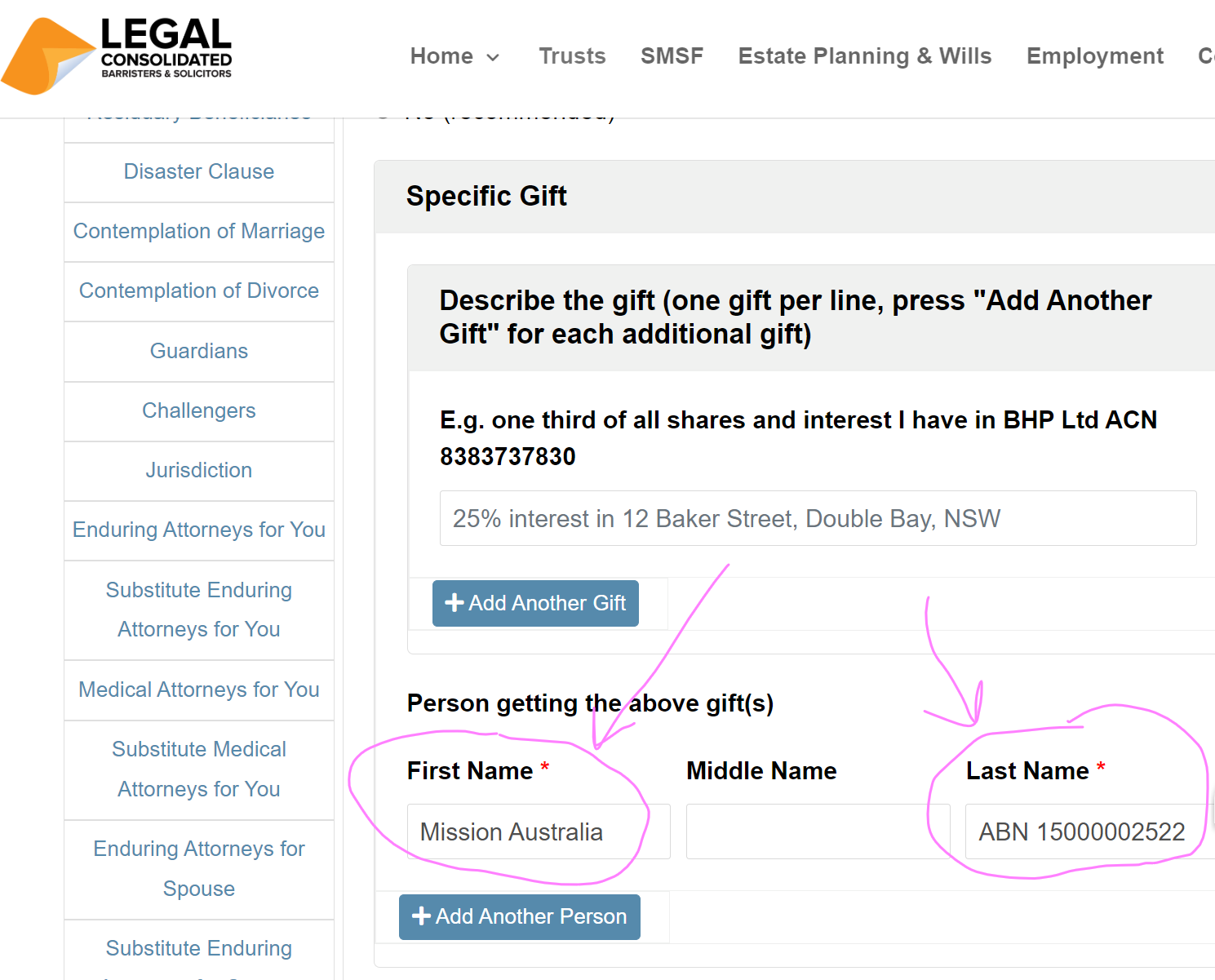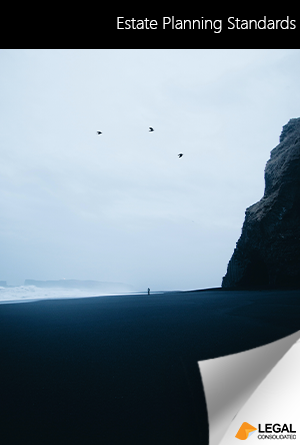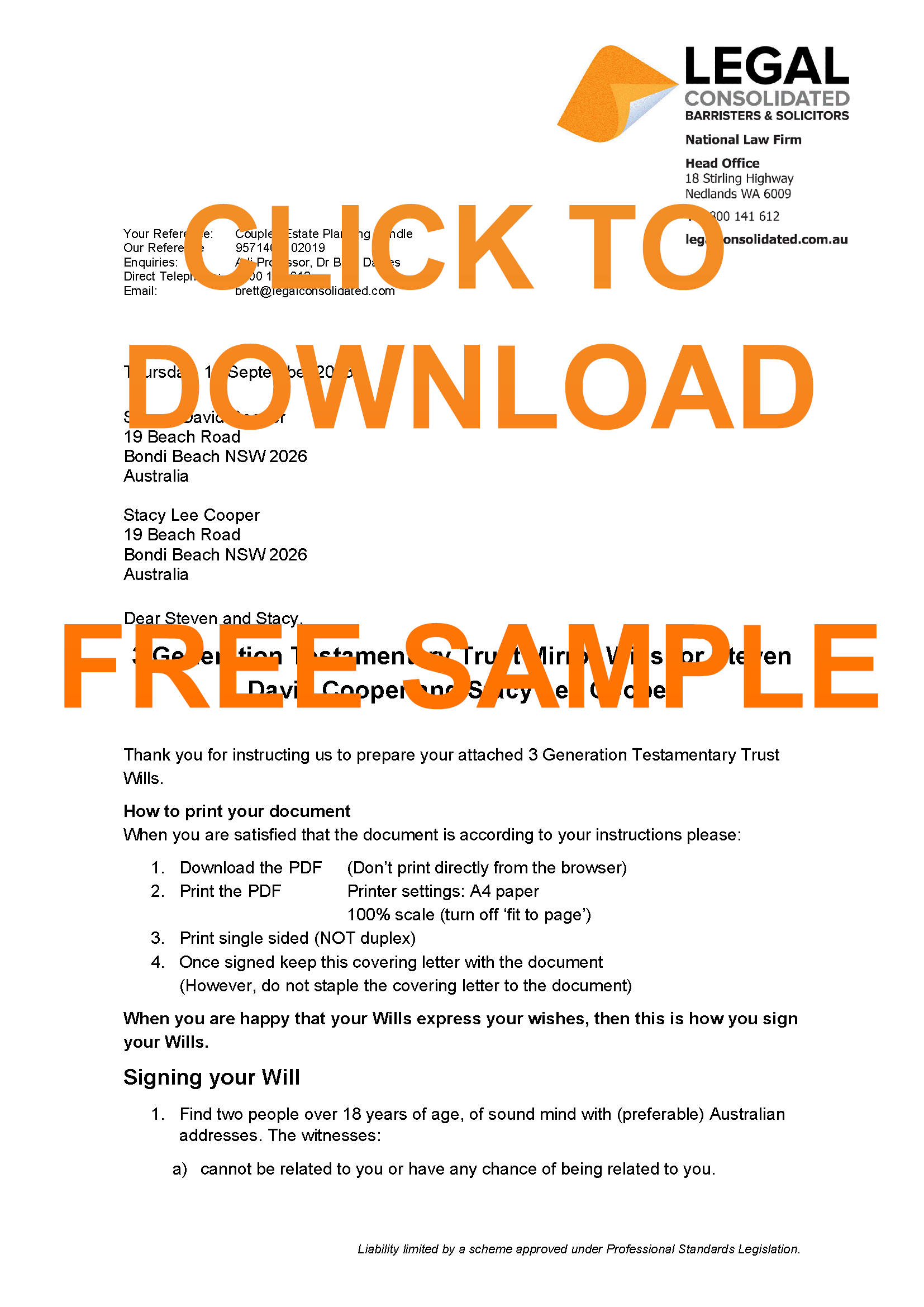Best practice for accountants and advisers building Wills on our law firm’s website
Welcome to Legal Consolidated’s Estate Planning Standard Policy. The Best Practice Policy is for Accountants, Licensees and Advisers.
There is an obligation by accountants and advisers to initiate, explain and support the needs of a client:
- Estate Planning
- Tax-effective Wills
- Medical/Lifestyle Powers of Attorney, Guardianships and Appointing Medical Treatment Decision Maker
- Enduring Powers of Attorney
- Contractual Will Agreements – for second marriages
- Loans to Children – to escape bankruptcy and the family court
- Deed of Gift
- Forgive a Debt Agreement
- Changing control of a Family Trust at death
Advisers and accountants have close, ongoing relationships with their clients. A natural extension of this relationship is discussing estate planning. While a lawyer may see a client for a few hours, an adviser and accountant hold a special fiduciary relationship with their clients. They have unparalleled knowledge of the client’s family circumstances and overall affairs.
Often the client, even after many years of requests, still ‘can’t find the time’ to see a taxation lawyer to attend to their Estate Planning. Even then, what can a lawyer learn in a few hours versus the continual ongoing relationship with the accountant and financial planner?
The best solution is for the adviser and accountant to be the centre of the universe regarding Estate Planning. And build the Estate Planning documents on the law firm’s website. The law firm remains responsible for the Estate Planning documents.

You are building two documents:
- Estate Planning Standards Policy
This sets out the compliance issues for accountants and financial planners building Wills, POAs, Estate Planning and other documents on our law firm’s website.
The Policy includes accreditation requirements. It is designed for accountants, dealer groups, and advisers seeking best practices for building Wills on our law firm’s website. - Estate Planning Manual
The Manual contains a wealth of marketing information for you to use to market your Estate Planning services. Use the images and wording as you see fit.
Our law firm’s skill in Estate Planning
I am an Adjunct Professor lecturing both the Estate Planning and Superannuation units at a number of universities around Australia. I have done so since 1999.
Of my seven degrees, four of them are in law including my doctorate. My research was in Estate Planning and succession planning.
I author the two Australian leading textbooks on Estate Planning: CCH Australian Estate Planning and Thompson Reuters’ Australian Financial Planning Handbook.
Our ‘3-Generation Testamentary Trusts’ include:
- 3-Generation Testamentary Trusts – reduces CGT, Stamp duty and income tax for 80 years from the date of death
- Super Testamentary Trust – reduces the 17% and 32% tax on Superannuation going to adult children
- Bankruptcy Trusts – if a beneficiary is bankrupt
- Divorce Protection Trust – if a child separates
- Maintenance Trust – where beneficiaries under 18 years of age or unstable
Best Practice in building Estate Planning documents
Build these two documents. They provide you with best practice in building legal documents on our website.
Who is better at Estate Planning – lawyer or adviser?
I had a call from an adviser in Sydney. His client died. His children telephoned the adviser. They claim that Dad’s estate is worth $2.5m. However, the death tax is $800,000.
I found that hard to believe.
The adviser informs me that the only asset of the dead father’s estate is $2.5m from life insurance in the Superannuation fund. Since the children are over 18, a 32% non-dependency tax applies.
I asked why there is no Superannuation Testamentary Trust in the Will. This reduces the non-dependency tax on the super. I telephoned the lawyer who prepared the Will. He is a well-respected family lawyer whom I know. To protect him, I call him Robert. This is how the call goes:
Brett: Robert, how come you did not put a Superannuation Testamentary Trust in his Will?
Robert: Brett, as you know, I only practice in family law. I was not aware that there is a tax on superannuation at death. I did put a note in the cover letter warning that I do not do tax. In the future, when I prepare another will, which is not often, I will add a note to confirm that I do not provide advice on tax and superannuation.
Brett: But Robert, did you speak with the client’s accountant and financial planner?
Robert: I did not see much need to do so. I am the lawyer, not them.
The financial planner and accountant are the centre of the universe. Those professionals assemble the team and source the best risk adviser, family lawyer, tax lawyer, sharebroker, actuary, finance broker, etc.
Estate Planning is best controlled by the accountant and the financial planner. They know the client. They are the best professionals to serve as project managers for the estate planning process.
As the accountant and financial planner, you are the centre of the universe. You bring the team together and manage the estate planning process.
Build the Estate Planning Quality Assurance Manual. The Manual authorises you to build Estate Planning documents on our website, throughout Australia, including the:
We look forward to helping you grow your Estate Planning practice.
New profit centre for Accountants and Financial Advisers:
Estate Planning
Some people incorrectly limit Estate Planning to a lawyer making a Will.
I have prepared an email for you to send to your clients, setting them straight. Estate Planning is best managed by the trusted Accountant or Financial Planner.
Build, for your clients, these Estate Planning documents on our website:
You are entitled to charge your normal fees for providing the work on the Estate Planning file.
Every document you build for your clients includes our law firm letter confirming that we authored the document.
We are Australia’s only law firm providing legal documents online.
Your clients benefit from:
- law firm Professional Indemnity insurance
- legal professional privilege
- free legal advice, from us, as you build the documents
- document sample with explanatory notes
As you build the Wills, POAs, and Medical POAs online, there are many hints and training videos available. Please contact me or my lawyers for help as you build the documents.
Keep control. Protect your clients.
Send this email to your clients:
Dear client,
Every year, Australian tax payers voluntarily pay the Tax Office millions of dollars in “Death Taxes”.
I am going to make sure you are not going to be one of them.
Proper Estate Planning ensures that your estate goes to those you care about, and not the Tax Man.Does the “Simple Will” protect your family?
Many people believe that their affairs are simple. You may wish to simply leave everything to your spouse, and if they die before you, then to your children. Simple. Right? Unfortunately, this is rarely the case. There are pitfalls of preparing a non-tax-effecitve Will. A non-taxeffective Will may seem to fulfil your needs on the surface, but there are often many other issues that you may not have considered. I am going to make certain that your estate goes to your family and loved ones – and not the Tax Man.
Will the Tax Man smile when I die?
Imagine $1.5 trillion “up for grabs!” That is the projected total value of estates from Australians who die in the next 20 years. The question is, who gets that money: the Tax Man, Trustee Companies or your family?
Careful planning reduces Capital Gains Tax, Stamp Duty, income tax and the 17% or 32% superannuation tax on adult children. A 3-Generation Testamentary Trust and Superannuation Testamentary Trust provides the best protection for your family. A 3-Generation Testamentary Trust is the most effective safeguard to put into your Will to dampen the effects of Capital Gains Tax and Stamp Duty.
This is an example of a Will without a 3-Generation Testamentary Trust:
Tom always wanted to build his retirement home on the canals where he had purchased a block a few years ago. Unfortunately, Tom died before realising his dream to build on the block.
As a dutiful husband, Tom left everything to his much-loved wife Jenny.
Little did Tom know, but Jenny never shared Tom’s vision to live by the canals. Their two children did share Dad’s vision. Jenny decided to give the children the block of land. After all, it was now interfering with her aged pension and pharmaceutical entitlements.
The gift made the children excited. The block had increased in value to $175,000. However, the children were less excited when they got a Stamp Duty bill of over $4,200.
Later, Jenny gets a notice from the Tax Office to pay Capital Gains Tax of $28,000.00 on the “disposal” of the block. (“But I just gave it away!” she lamented)
The nightmare continues when Centrelink advises Jenny that the gift reduces her entitlements because of the Non-Abandonment rule.
Tom could have put 3-Generation Testamentary Trusts into his Will. Tom’s Will then leaves everything to his wife, children and extended family. Tom also makes his wife Trustee of the 3-Generation Testamentary Trust. Jenny controls the assets but does not own the assets for tax purposes.
Does that mean that Tom’s estate goes to Tom’s mother-in-law and Uncle Harry? Do the children have control over what Jenny does with her husband’s estate?
No, to both questions.Jenny has full control of who gets what from the estate. With a Testamentary Trust, Jenny can give everything to herself or give some things to the children, grandchildren or any of the extended family as she so wishes. With her Accountant’s help, Jenny can take advantage of the lower income tax rates paid by some members of her family. Now that is flexibility.
Flexibility: 3-Generation Testamentary Trust?
In the above case, Jenny could have merely distributed the block to her children through Tom’s Will. Even if the transfer took place years after Tom’s death, the transfer is direct from Tom to his children. Therefore:
- No stamp duty is payable because Jenny did not own the land – she merely controlled the land in the Testamentary
- There is no “disposal” of the asset. Therefore, Jenny does not have a Capital Gains Tax bill – CGT Generation Skipping.
- Alternatively, the asset could have been kept out of Jenny’s hands to protect her Centrelink
Stop government meddling?
Mutual Power of Attorneys and Cascading Power of Attorneys
Sadly, your spouse gets Alzheimer’s disease at 61 years of age. Your children have left home. You decide to sell the large family home. You want to buy a smaller home closer to amenities that can help your spouse.
The family home is in both your names. Your spouse no longer has the legal capacity to sell the home. While there are many different types of Power of Attorney, you have none. Therefore, your only option is to apply to a government instrumentality for permission to sell the home.During this Tribunal procedure, your children are asked to swear in court as to whether you are a “spendthrift”. Other people such as friends, other family members and even nosey neighbours may be contacted by the government to see whether they support your application. At the hearing, you are cross- examined as to whether you are a “good person” to look after the affairs of your partner.
Eventually, this government department tells you that you are allowed to sell your home. However, it can direct that you hold your spouse’s half of the proceeds in a separate bank account. If you need to buy toilet paper for your partner then you may need to provide a receipt.
Without all the proceeds of the sale of the home, you cannot afford to buy another property.
Overcome the government’s meddling with both a Mutual Power of Attorney and a Cascading Power of Attorney.What do I do now?
Please contact me. I will build the estate planning documents you need with our lawyers.
These estate planning documents include:The cost for Estate Planning is $……………. This includes everything you need to fully prepare your entire Estate Plan.
Kind regards,
Your Name
Who is responsible for the documents you build on our law firm’s website?
- Legal Consolidated is responsible for the documents.
- Your client becomes our client.
- There is a direct client relationship between us and your client.
- Every document has a letter confirming that we authored the document, built on our website.
Legal Consolidated website vs pretend law firm website
- Over 6,400 Australian accountants, law firms and advisers build legal documents on our website.
- This is for their clients.
- As a law firm, your client becomes a client of the law firm.
- Therefore, our law firm is responsible for the documents built on our website.
- Every document is accompanied by a letter addressed to your client, confirming that we authored the legal document.
In contrast, a non-law firm website:
- merely resells a lawyer’s template; and
- therefore, there is no law firm responsible for the documents you built for your clients
Pretend-law firms’ websites merely resell a lawyer’s template – dangerous
Non-law firm websites buy, beg, borrow or steal a law firm’s template.
Often, the templates are never updated or monitored by a law firm. In Australia, a law firm is not responsible for ‘resold’ templates. You, as the accountant and your client are on your own.
Worse still, the adviser and accountant are providing ‘legal advice’. This is because non-lawyers resell the template. There is no direct relationship between the lawyer who first provided the template and the end-user, who is the accountant’s client. ‘Tax agent services’ does not extend to giving legal advice: s90-5(1) TASA 2009. Non-law firm websites do not provide protection for tax agents.
ACT and South Australian tax agents using non-law firm websites breach:
- s16(1) & 21(2)(b) Legal Profession Act 2006 (ACT); and
- Legal Practitioners Act 1981 (SA)
Using a pretend law firm website breaches ‘preparing documents that create or regulate legal rights’.
In Western Australia, a non-law firm website breaches the ‘preparing of any deed, instrument or writing dealing with real or personal estate’.
Even the supply of Trust Deeds and Employment Contracts breaches the law. A tax agent building trust deeds on a non-law firm website breaches the law: Legal Practitioners Act 1981 (SA).
Incorporating a company on a non-law firm website breaches the law because a company needs (or should have) a constitution. A constitution is a ‘deed’. Only lawyers can legally prepare deeds. Similarly, a POA is a deed. So an accountant or adviser building a POA on a non-law firm website, including a website provided by a State government, breaches the law.
We do not resell a lawyer’s template. We are the law firm.
Before using a pretend law firm website, consider:
- Who is drafting the legal document? The Family Trust Deeds, Power of Attorneys, 3-Generation Testamentary Trust Wills, Loan Agreements, Leases and the 100s of other documents are drafted by the Australian law firm Legal Consolidated Barristers & Solicitors.
While accountants and clients may type in answers to the questions, the law firm controls the logic flow, questions, hints, training videos and systems. We retain the copyright of our documents, and we are responsible for the legal document. The law firm is drafting the online document.
- Who is responsible for the drafting and its legal correctness? The law firm developed and controls the system. The law firm provides locked PDF documents of the finished document, together with a cover letter on the law firm’s letterhead confirming that we prepared and drafted the legal document.
- Where are the client’s personal information and data stored? All information is stored on the law firm’s website. Your client retains legal professional privilege. However, Legal Consolidated does not see or retain any person’s credit card details.
- Can non-lawyers charge to prepare legal documents? No, they cannot. However, a professional, such as a financial adviser or accountant, can charge for the time spent providing relevant financial planning and accounting advice.
For example, much of the work in estate planning involves understanding the client’s tax position, financial planning, superannuation, insurance, and business structures. Just as you cannot give legal advice. We are unable to provide financial planning advice. For example, we can not advise on reversionary pensions. And we are not licensed tax agents.
We sign off on all documents built on Legal Consolidated’s website – the law firm
Non-qualified suppliers of legal documents claim that their Deeds are ‘signed off’ by an Australian lawyer.
This suggests that a lawyer has approved the legal document you are building online.
However, there can only be a ‘lawyer sign off’ when the legal document is prepared directly on a law firm’s website, such as Legal Consolidated Barristers & Solicitors’ website.
This is not the case with non-law firm websites.
Be cautious with websites that law firms do not operate. Ask these non-law firm websites three questions:
- Who is responsible for the legal document?
- May I please have the above answer on a law firm’s letterhead?
- Where is the cover letter, on law firm letterhead, confirming that the law firm authored and is responsible for each document I build on your website?
Is a resold lawyer template on a non-law firm website protected?
A resold lawyer template sold by a website pretending to be a law firm is:
- not from the law firm directly
- not ‘signed off‘ by a lawyer
- not protected by an Australian law firm
With all Legal Consolidated Deeds, you get a cover letter. A lawyer from our law firm signs it. It confirms that Legal Consolidated authored the legal document.
Are accountants and advisers giving legal advice when using our website?
Legal Consolidated’s website enables accountants, lawyers and financial advisors to build legal documents for their clients. Documents include Trust Deeds, Self-Managed Super Deeds, Companies and 3-Generation Testamentary Trust Wills.
On our website, you deal directly with a law firm. Therefore, you get:
a. Legal Professional Privilege
b. legal advice and help to answer online questions – telephone, email or chat with us
c. letter confirming that Legal Consolidated Barristers & Solicitors authored and is responsible for the document
d. the law firm is responsible for the legal document including:
-
-
-
- the questions, hints and training videos
- dynamic logic flows – the next question changes depending on the previous answer
- the answers you type in (e.g. if the accountant or adviser incorrectly misspells the client’s name, we are responsible)
- legal documents, minutes and a cover letter
- the signing of the documents
-
-
Am I giving legal advice when I build a document on a law firm’s website?
You are not giving legal advice when you build documents on our law firm’s website. You are a ‘mere scribe’. See:
- Attorney-General v Quill Wills Ltd (1990) 3 WAR 500
- Legal Practice Board v Computer Accounting and Tax Pty Ltd [2007] WASC 184
- Cornall v Nagle [1995] 2 VR 188 at 210
- Tax Agent Services Act 2009 (Cth)
- Sinclair v C of T [2010] AATA 902
- Andre Agassi v Robinson & Bar Council & Law Society [2005] EWCA 1507
The Tax Institute’s Estate & Business Succession Planning, 7th edition, states on page 9:
‘Work that is undertaken in association with the law or legal practice will not necessarily constitute engaging in legal practice. Examples include:
* clerical or administration tasks
* selling legal documents; and
* advising of incidental legal requirements by a person in the pursuit of an occupation other than law, eg tax agents advising on the requirements of tax legislation.’
What about a financial planner’s Dealer Group?
The Australian Financial Licensee (AFS) provides a list of ‘financial products’ that financial advisers offer their clients. Legal services, such as those provided by our law firm, are not investment products. They are legal documents.
Your practice can build legal documents online for clients. Each document is accompanied by our letter, confirming that we authored it.
Some dealer groups and accounting houses require that a lawyer speak to your client. Just tick the box as you build the document, if you want this service. A lawyer contacts your client directly regarding the document.
Build your own Estate Planning Standard Policy for your practice.
For Estate Planning, what do the accountant and adviser put on the Tax Invoice?
Q: We have just completed our first Estate Planning bundle for our client.
I am grateful that Legal Consolidated Barristers & Solicitors provides a written letter on its letterhead. The letter is addressed directly to the client. It confirms that Legal Consolidated is the sole author, owner and is responsible for the legal document.
Your online building process for Estate Planning allows me to generate a new revenue stream from work that I am essentially already doing. Your website gives me the confidence to advise on the benefits of estate planning. It is a complete service model for my practice.
We are about to invoice the client for our time as a scribe. This is for typing in the answers to the questions.
What wording do you consider appropriate for our invoice for being a scribe?
A: I do not think you look at it from the correct perspective. On the back of many accountants’ and financial planners’ business cards, you see a list of services. One of them is often ‘Estate Planning’.
Estate Planning is much more than a Will and POAs. A Will and POAs are, with respect, only a minor part of a lifetime Estate Planning process that accountants and advisers embark upon for each of their clients. For example, is it not the adviser’s job to 1. create wealth, 2. preserve wealth and 3. transfer wealth at the correct time, such as divorce, death and succession planning?
Further, many aspects of Estate Planning are the sole province of the financial planner. This includes Reversionary Pensions, superannuation and the like. Similarly, only accountants can advise on the taxation implications and preparations.
I would have thought that on your Tax Invoice, you would put “Estate Planning $6,500” or whatever fee you charge as a financial planner or accountant. And then add incidental costs such as the costs of the insurance broker, finance broker fees, estate planning lawyer fees, valuers fees and the like.
Can the adviser’s client pay for the documents with their own credit card?
Yes, regardless of whose account it is in, any credit card can be used to pay for the document, and that credit card can be different each time.
So the client can pay directly with their credit card.
This is true even though the account is in the name of an accounting practice, financial planning firm, or law firm.
Can I, as a Lawyer, Accountant, or Financial Planner, Be Appointed the Executor of My Client’s Will?
Appointing yourself as the executor of a client’s Will is fraught with risks. You assume dual roles: executor and professional adviser, leading to potential conflicts of interest. This duality can result in personal liability, disputes over fees, and challenges from beneficiaries.
The Risks of Dual Roles: Executor and Professional Adviser
When you serve as both executor and professional adviser, you may face:
-
-
-
Conflicts of Interest: Balancing fiduciary duties with personal or professional interests.
-
Legal Liability: Exposure to lawsuits from beneficiaries or third parties.
-
Reputational Damage: Perceptions of unethical behaviour can harm your professional standing.
-
-
Court cases on conflicts of interest for lawyers, accountants and financial planners in Wills when being the executor
Australian and international courts have consistently ruled against professionals who act as executors while maintaining financial interests in the estate.
-
-
-
Cavanagh v Mace [2023] VSC 670: An executor was passed over due to mismanagement of the estate, unmanaged conflicts of interest, and deficiencies in character, rendering her unfit to act. This case illustrates the high standards and how easily an executor can be attacked. An attack damages your reputation.
- Mataska v Browne [2013] VSC 62: The court passed over an executor who had a conflict of interest and failed to properly administer the estate, highlighting the necessity for executors to act impartially and in the best interests of all beneficiaries. This can also be a problem for advisers wearing two hats.
-
Cavanagh v Mace [2023] VSC 670: A financial adviser was appointed executor but was removed by the court due to mismanagement of the estate and unresolved conflicts of interest. The case highlighted the risk of professionals being perceived as acting in self-interest rather than in the best interests of the beneficiaries.
-
Mataska v Browne [2013] VSC 62: A lawyer assisting the executors was removed after the court found their personal financial interests conflicted with their duty to administer the estate impartially. The case reinforced the court’s willingness to intervene when executors are perceived to prioritise their own position over the estate’s proper management.
-
Quinton v Gavin 64 Mass. App. Ct. 792 (2005): A financial adviser serving as an independent trustee of multiple trusts was held liable for deceptive practices under consumer protection laws. The case confirmed that financial advisers acting as fiduciaries can be scrutinised under similar legal frameworks as other service providers, exposing them to legal consequences if they act in their own interest.
-
Haynes v First National State Bank of New Jersey 87 N.J. 163, 432 A.2d 890 (1981): A lawyer drafted a Will that appointed himself executor, leading to accusations of undue influence. The court found that his position as both the Will drafter and executor created an inherent conflict of interest, strengthening the presumption that the lawyer had influenced the client’s decision.
-
Fitch v McDermott, Will and Emery, LLP 401 Ill. App. 3d 1006, 929 N.E.2d 1167 (2010): A law firm faced malpractice claims after failing to disclose conflicts of interest when advising both a client and the co-trustees of a trust. The court ruled that lawyers must disclose potential conflicts of interest, or they risk being sued for damages.
-
-
Why Beneficiaries Are Often the Best Executors
Beneficiaries typically have the most significant interest in the proper administration of the estate. Even if they have personal conflicts, their vested interest usually motivates them to act diligently and fairly. Appointing a professional adviser as executor can introduce unnecessary complications and potential conflicts.
CPA Australia’s Perspective on being Executor
CPA Australia advises accountants to carefully consider the complexities and potential liabilities before accepting the role of executor. They emphasise that while being appointed executor reflects a client’s trust, the responsibilities can be burdensome and time-consuming. Accountants may lack the specialised knowledge required to navigate the demands of estate administration effectively. Risks include personal liability for unpaid debts and the potential for inadequate remuneration due to the extensive work involved.
Legal Practitioners’ Liability Committee (LPLC) Insights on being an executor
The LPLC underscores the importance of understanding the key risk areas in wills and estates work. They caution legal practitioners about common mistakes in estate administration, including conflicts of interest and errors in preparing Wills. The LPLC recommends that practitioners be vigilant in identifying and managing these risks to avoid potential claims.
Essential Steps Before Accepting an Executor Role
If, despite these risks, you consider accepting the role of executor:
-
-
-
Full Written Disclosure: Provide the client with comprehensive written reasons explaining why beneficiaries are unsuitable and detail your fees and potential conflicts of interest.
-
Assess Client’s Best Interests: Ensure that your appointment aligns with the client’s best interests, understanding that this decision may be subject to legal scrutiny.
-
-
Best Practices for Advisers that are willing to take on the risk of being a client’s executor
To mitigate risks:
-
-
-
Full Written Disclosure: Clearly outline potential conflicts of interest and fee structures to the client.
-
Client’s Informed Consent: Ensure clients understand the implications of appointing their adviser as executor.
-
Consider Alternative Executors: Discuss the benefits of appointing impartial executors, such as beneficiaries or independent professionals, to mitigate conflicts.
-
-
Adhering to these practices allows advisers to navigate the complexities of acting as both a professional adviser and executor, aligning with legal standards and ethical obligations.
Should the Will require the family to use your Professional Services?
So, you have wisely decided that acting as the executor of your client’s Will is too risky. But what about including a clause in the Will requiring the family to consult your professional practice, whether as a lawyer, accountant, or financial planner?
This approach is flawed and often backfires. The Will exists to distribute the deceased’s assets, not to serve as a succession plan for the professional adviser. Courts and beneficiaries see these clauses as intrusive, unethical, and unenforceable.
A Will cannot Force Beneficiaries to Use Your Services
Any clause in a Will attempting to force the executor or beneficiaries to engage a specific accountant, lawyer, or financial planner is generally unenforceable:
-
-
- A Will cannot control the actions of living people beyond distributing the deceased’s estate.
- Beneficiaries resent being told what to do, especially by an adviser they did not choose.
- Executors have legal autonomy to act in the best interests of the estate. Courts will not enforce a clause that limits their ability to seek independent legal or financial advice.
-
Beneficiary Backlash when the Will maker appoints a professional adviser in his Will
We have seen that the authorities have refused to enforce such clauses, as they serve the interests of the professional adviser rather than the estate or beneficiaries. Beneficiaries frequently challenge these clauses, and the result is often hostility toward the professional who inserted them.
Executors and beneficiaries have fiercely opposed these attempts at control. Many view it as an underhanded tactic—a means for the professional to secure ongoing fees from the estate, rather than a legitimate effort to assist with estate administration.
In the USA, the New Jersey Advisory Committee on Professional Ethics discusses the ethical implications of a lawyer drafting a Will that includes provisions benefiting themselves, such as appointing themselves as executor or mandating their services for the estate. The committee highlights potential conflicts of interest and the importance of maintaining professional integrity.
A Better Approach: Win Over the Next Generation before the Will maker dies
Rather than forcing yourself into the estate through the Will, the more ethical and successful strategy is to build relationships with the next generation before the Will maker dies. This ensures continuity in a natural and accepted way, rather than by legal coercion.
-
-
- Encourage family meetings where you explain estate planning to the beneficiaries.
- Provide value before the Will maker dies, offering financial, tax, or legal advice to the children.
- Develop trust and goodwill, so that when the Will maker dies, the family turns to you by choice, not because of an unenforceable Will clause.
-
A Will is not a business development tool for lawyers, accountants, or financial planners. Any attempt to force beneficiaries to use your services will be met with hostility, legal challenges, and reputational damage. The better approach is to earn the next generation’s trust so they choose to engage you naturally.
Let the quality of your work, not the wording of a Will, secure your professional future.
Protects from death duties, divorcing, bankrupt children and a 32% tax on super. Build online with free lifetime updates:
Couples Bundle
Includes 3-Generation Testamentary Trust Wills and 4 POAs
Singles Bundle
includes 3-Generation Testamentary Trust Will and 2 POAs
Death Taxes
- Australia’s four death duties
- 32% tax on superannuation to children
- Selling a dead person’s home tax-free
- HECs debt at death
- CGT on dead wife’s wedding ring
- Extra tax on Charities
Vulnerable children and spend-thrifts
- Your Will includes:
- Divorce Protection Trust if children divorce
- Bankruptcy Trusts
- Special Disability Trust (free vulnerable children in Wills Training Video)

- Guardians for under 18-year-old children
- Considered person clause to stop Will challenges
Second Marriages & Challenging Will
- Contractual Will Agreement for second marriages
- Wills for blended families
- Do Marriages and Divorce revoke my Will?
- Can my lover challenge my Will?
- Make my Will fair: hotchpot clauses v Equalisation?
What if I:
- have assets or beneficiaries overseas?

- lack mental capacity to sign my Will?
- sign my Will in hospital or isolating?
- lose my Will or my home burns down?
- have addresses changed in my Will?
- have nicknames and alias names?
- want free storage of my Wills and POAs?
- put Specific Gifts in Wills
- build my parent’s Wills?
- leave money to my pets?
- want my adviser or accountant to build the Will for me?
Assets not in your Will
- Joint tenancy assets and the family home
- Loans to children, parents or company
- Gifts and forgiving a debt before you die
- Who controls my Company at death?
- Family Trusts:
- Changing control with Backup Appointors
- losing Centrelink and winding up Family Trust
- Does my Family Trust go in my Will?
Power of Attorney
 Money POAs: NSW, VIC, QLD, WA, SA, TAS, ACT & NT
Money POAs: NSW, VIC, QLD, WA, SA, TAS, ACT & NT
- be used to steal my money?
- act as trustee of my trust?
- change my Superannuation binding nomination?
- be witnessed by my financial planner witness?
- be signed if I lack mental capacity?
- Medical, Lifestyle, Guardianships, and Care Directives:
- Company POA when directors go missing, insane or die
After death
- Free Wish List to be kept with your Will
- Burial arrangements
- How to amend a Testamentary Trust after you die
- What happens to mortgages when I die?
- Family Court looks at dead Dad’s Will

